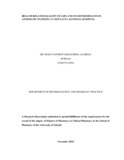| dc.description.abstract | Background
Health Related Quality of Life (HRQoL) is an important measure of health outcomes since it reflects the impact of an illness and its treatment, from the patient’s perspective. The disease though common and whose control is achievable, it is often misdiagnosed and undertreated in most parts of the world Kenya included, causing its burden to rise. A significant proportion of patients with asthma, especially from poor settings, suffer daily activity limitations, reduced productivity and the associated socioeconomic burden.
Objective
To determine the Health Related Quality of Life (HRQoL) and factors influencing it in asthmatic patients who attend Kenyatta National Hospital (KNH) chest clinic for their routine management.
Methodology
A cross-sectional study was conducted at Kenyatta National Hospital (KNH) chest clinic in the year 2018. The study targeted teenage and adult asthmatic patients on treatment at this facility. Consecutive sampling technique was used to obtain a representative sample of 140 consented participants. Data on HRQoL was obtained using Asthma Quality of Life Questionnaire with Standardized activities (AQLQ(S)), Asthma Control Test and Determinants of HRQoL Questionnaires in a patient-guided interview. Data analysis was done using STATA version 13 software. Inferential statistics was used to compare the distribution of variables across patients with good asthma control versus those with poor asthma control and also those with high versus those with low HRQoL. Logistic regression was conducted to determine the variables that are the independent predictors of asthma control and HRQoL in this population. A p-value of <0.05 was considered statistically significant.
Results
Asthma was controlled in 80% of the asthmatics with more than half (53%), reporting high asthma related quality of life. Poorly controlled asthma in the 20% was significantly
xiv
associated with low HRQoL, P<0.05. Variables in the study found to be significantly associated with uncontrolled asthma were occupational exposure, incorrectness of inhaler technique, presence of gastroesophageal reflex disease (GERD), type 2 diabetes mellitus coexistence, suboptimal inhaled corticosteroids dosage, lack of prescriber guideline usage and inappropriate treatment choice at the asthma severity step. Independent predictors of asthma control and thus HRQoL were; occupational exposure to asthmagens, GERD, diabetes mellitus and cigarette smoking.
Conclusions
Asthma-HRQoL outcome among patients was largely dependent upon the degree to which asthma was controlled. Asthma was controlled in 80% of the participants who slightly over half reported high HRQoL scores (53%). All the 20% participants in whom asthma was uncontrolled had low HRQoL scores. The independent predictors of asthma control and HRQoL included occupational risk exposure, GERD, type 2 diabetes mellitus and cigarette smoking. The symptoms and activity limitation domains of the HRQoL were the most negatively impacted by poorly controlled asthma.
Recommendations 1. Incorporation of HRQoL into routine practice as an important measurement for assessing the outcomes of asthma therapy. 2. Dissemination and support of adherence to current treatment guideline recommendations to all healthcare facilities for uniformity in asthma care. 3. Screening, early diagnosis and prompt treatment of GERD in asthmatic patients. 4. Recheck and re-demonstration of inhaler technique at every consultation. 5. Reduction in occupational exposure to asthmagens by shifting affected workers to departments with minimal or no exposure. Work-related stress reduction for those working in professions not associated with asthmagens.
Expected outcomes
Uptake and assimilation of HRQoL measure as an important tool in determining therapeutic outcomes leading to better managed patients and well controlled asthma | en_US |
| dc.description.department | a
Department of Psychiatry, University of Nairobi, ; bDepartment of Mental Health, School of Medicine,
Moi University, Eldoret, Kenya | |



